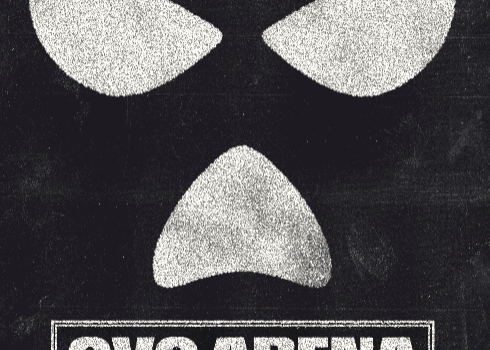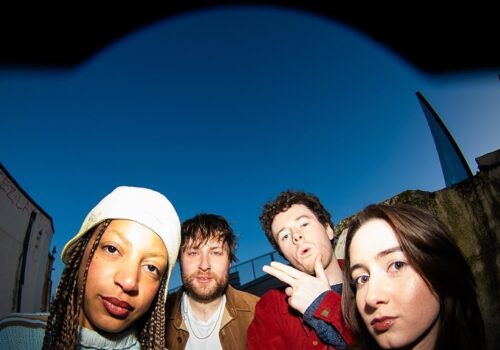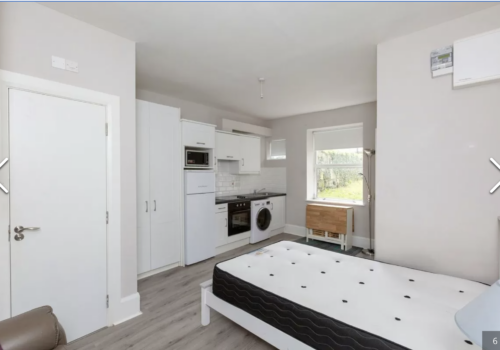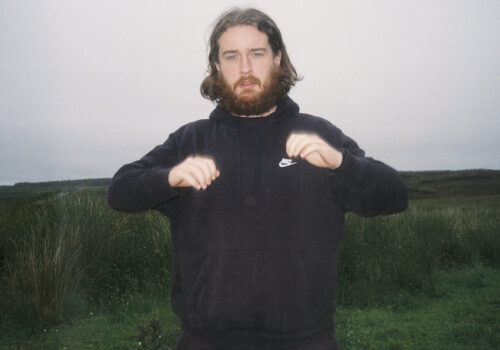Six Female-Identifying Creatives Who Are Shaping Dublin’s Culture
To mark International Women’s Day, District sat down with six Dublin-based artists to discuss what it means to cultivate female-friendly spaces, talk about their experiences as female creatives and how their respective industries can change for the better.
From nightlife to editorial, activism to music, all six of these women provided their insights to their careers so far and how they see themselves moving forward creatively amidst adversity, the cost of living crisis and other challenges to their work.
Rebecca Ewnetu – Yewth Magazine
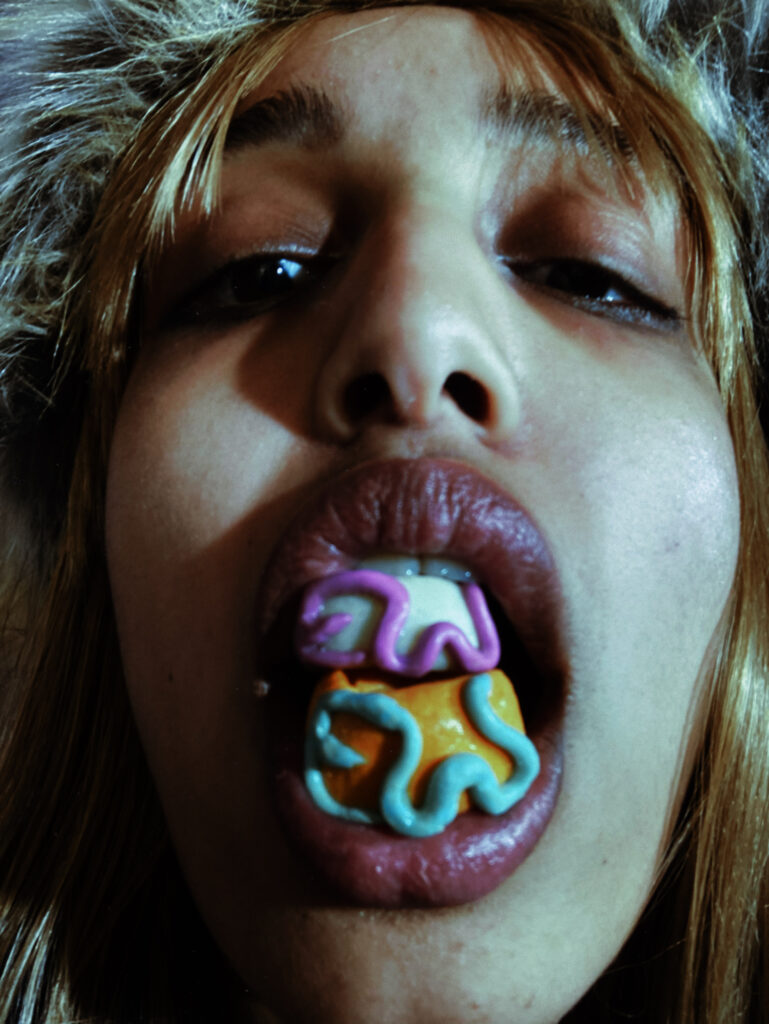
Founded less than a year ago, Yewth Magazine by Rebecca Ewnetu seeks to document Ireland’s youth culture like never before. Explicitly influenced by punk, Ewnetu first got the idea to start her own publication by following the work of London-based Aether Magazine: “It really stood out to me because it was owned by a black woman, and I had never seen a black woman make art like that before. It’s very inspired by her Jamaican heritage while still being punk. The whole project is Mia Sakai documenting youth culture and I thought – why can’t I do it too?”
Ewnetu has an unmistakable coolness to her but still voices her surprise at the willingness of the Irish creative community to recognise her work. “I’ve only been doing photography for eight months,” she explains. “I always was interested in art, fashion and sustainability while in school but my parents wanted me to focus on my academics first.”
Born in Ireland to an Ethiopian family, Ewentu notes how she has only started calling herself Irish in the past few years: “I’ve lived here for most of my life, I was born here. But I’ve always felt like I couldn’t call myself Irish because I looked different. It wasn’t until a year or two ago that I felt I could call Ireland my home, and then you see these protests [by the far-right] and it’s so upsetting.”
“At the same time, it makes me realise that youth culture needs to be documented right now more than ever, to show these people what young Irish people look like. It doesn’t matter what ethnic background you have – this is our home too.”
Ewentu simply wants fellow creators to explore the idea of collaboration more: “It’s really hard sometimes because, at the end of the day I am nineteen, I’m not as established as other creatives out there. It’s scary to reach out to certain people. It doesn’t help that creative opportunities in Ireland can feel limited – like I’ve had to make my own.”
“Right now I can’t name another black female photographer in Ireland. So I definitely want to stay in Ireland because of that and keep documenting youth culture in Ireland. If I’m not going to do it, who will?”
You can find out more about Yewth Magazine here.
Lisa Connell – Mother
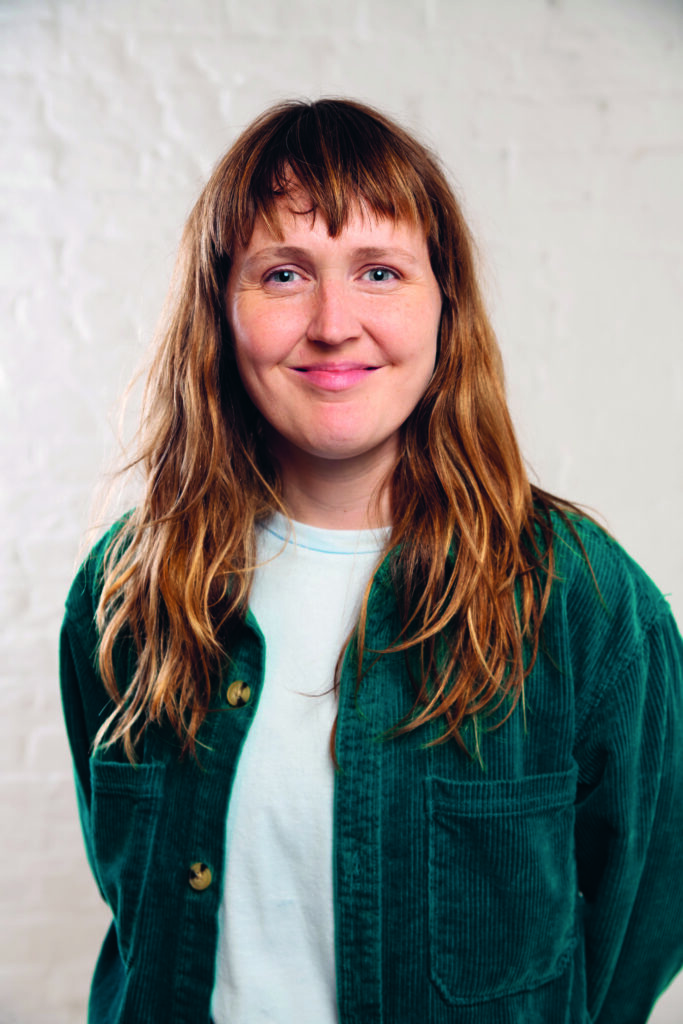
There’s a good chance you’ve been to, or at least heard of, an event that Lisa Connell has run. Primarily known for her work with the iconic Mother and Gay Community News (GCN), Connell has been a staple of the Dublin LGBTQ+ scene for over fourteen years.
Connell first got involved with GCN through volunteering and distribution, eventually rising through the ranks to become their Managing Editor. “I essentially annoyed them into giving me a job,” she jokes. “But sometimes that’s what it takes. Determination!”
Connell has witnessed the evolution of Ireland’s and more specifically Dublin’s queer scene through years of both adversity and triumph. You wouldn’t think it now, but Mother itself was born out of efforts to raise funding for GCN amidst the recession of the early 2010s. A true passion project of Connell’s, she is now focusing solely on Mother and live events after her departure from GCN.
Mother isn’t so much a night out, but more an institution. Connell can’t help but smile when discussing the work that they’ve done, and points to the upcoming Cultúr Club event they are running on March 16 in collaboration with St Patrick’s Festival. “I think one of the most unique things about Mother is that we always look back to support the community around us, to platform local acts and talent,” she notes.
Speaking of community, Connell is inherently aware of the negative treatment of transgender people in the Irish media, so much so that it consistently comes to the front of our conversation. “With any club night, you want to make sure that the people attending your events get to interact with sound people. That’s it. One small interaction can ruin a person’s night. I would hate to think of anyone having a negative experience while at Mother.”
“Before each night, especially if we’re in a new venue, we have a briefing with all staff about gender presentation and ID cards, bathrooms, and things like that. With everything in the media, we want to be able to facilitate a space for queer expression, unapologetically.”
You can keep up to date with all things Mother here.
Derv. – Salvaged

Dearbhla Woods, who performs under the name Derv, has been a music enthusiast for as long as she can remember. Citing her friends as the main reason she became involved in music, Derv laughs as she remembers how she used to “sneak into clubs like Hangar with a fake ID at sixteen” to listen to techno artists.
Having previously balanced her final year of college and working part-time in retail while establishing herself as a DJ and promoter, the co-founder and promoter of Salvaged is now looking to expand her work to help platform fellow artists in Dublin.
On the topic of gender imbalance in the Dublin nightlife scene, Derv immediately points to instances of known misogynists being booked for club nights: “It’s very disappointing because, if they just listened to women, I don’t think it would happen as much. There are still too many all-male lineups in general, to be honest. It’s a really weird situation to think that women aren’t considered in more ways than one sometimes.”
“It’s easy to think negatively about yourself as a female DJ in a space that is predominantly male-dominated, but you have to get passed that and push through because you know you deserve the space as much as anyone else if you put the same work in.”
However, Derv is also quick to praise the work being done by various club nights and promoters across the city who actively platform women and other gender minorities such as Skin and Blister, Slither and Ethereal Skies. “This Saturday, Ethereal Skies will be hosting an all-female line-up in Wigwam,” she notes. “It’s great to see.”
Our conversation then turns to the fact that Dublin’s lack of ability to function as a nightlife space hinders these opportunities for everyone. “Being a promoter, knowing what goes on behind the scenes, you know that putting on a club night involves a costly risk. People want to break even, that’s fair. But Local DJs often aren’t paid adequately in comparison to some international artists’ fees, you want everyone to be treated equally so it’s hard to find the balance at times with a local and international scene.”
“It is an intimidating space at the end of the day,” Derv explains. “What I’d like is for people to start considering how we can bring more women and marginalized artists into these spaces in a way that recognises their talent. Whether it’s profiling these women or creating a network. It should never be the case of ‘oh we have to find a female DJ for this line-up’ but rather that they fit the bill. This city has so much female talent – they should be there already.”
You can find out more about Derv’s work with Salvaged here.
ÉFÉ
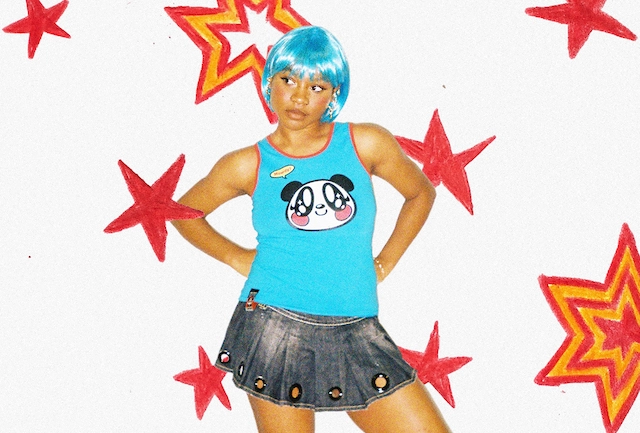
ÉFÉ is most exciting musical acts to appear in Ireland’s music scene in recent years. Having played Glastonbury and supported Paulo Nutini on his most recent tour of Ireland, ÉFÉ has always believed that she would be involved in music “in some way”, but it wasn’t until the emergence of bedroom-pop as a genre that she started to concentrate her efforts.
“It was people like Clairo,” ÉFÉ explains. “The people creating these DIY, low-budget videos really inspired me. It seemed quite accessible, so I thought I could try too.”
For ÉFÉ, her visual style is just as important as her sound. Why is this the case? The sense of control it gives her. “I’ve always wanted to create music videos, I can’t remember a time that I didn’t. And so exploring directing, taking that extra step in my career has been very fun. It’s been a breakthrough moment for me, realising that I want to do these other creative elements alongside my music.”
Having played her first headline show last August, ÉFÉ mentions how appreciated she feels amongst the Irish music community but notes that more can be done to facilitate other female artists receiving recognition in the scene in general: “I wish there was a way we could connect women coming together more. When it comes to looking for say, a female drummer or producer, I want to be able to explore my options. Because even when I was learning to produce, I found it was really male-dominated.”
You can stream ÉFÉ’s music here.
Kerry Mahony – HONEYPOT
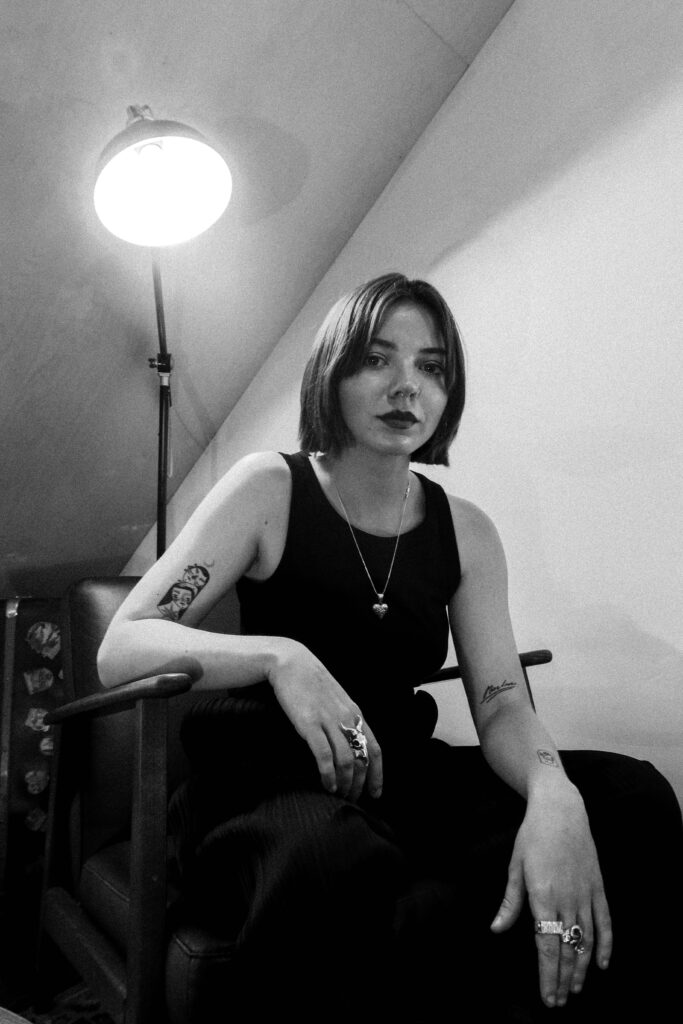
Multi-disciplinary creative and writer Kerry Mahony first moved to Dublin when she was eighteen. Six years later, she now writes an arts and culture column for Totally Dublin while also co-running the queer club night HONEYPOT. Having witnessed the evolution of the city pre and post-COVID, Mahony remembers her excitement at witnessing gay clubs and queer creativity in-person: “I think Dublin’s creative scene and its queer scene have only grown since then. Admittedly, things do feel inaccessible – my rent continues to go up the longer I’ve been here – but at the same time, the ambition that everyone has only grown too.”
But what it means to be a multi-disciplinary creative in Dublin in 2023? Mahony touches on the concept of collaboration and sharing resources: “There isn’t much room for gate-keeping [in the community]. It’s really nice that people are eager to collaborate rather than compete. When we founded HONEYPOT last year, we were thrilled to feel so welcomed straight away.”
Mahony makes a point of the issue that many barriers to creativity often come from the “top-down”. “Whether it’s rent costs or different fees in venues, you can feel like you lose a bit of control,” she explains. The issue of financials, Mahony feels, also translates into class barriers that exist in the creative community: “Being a creative who grew up outside of Dublin or grew up not having a lot of connections – I feel like we haven’t had that conversation as a community.”
“Growing up working class, getting the SUSI grant so I could go to college – you notice that you’re at a disadvantage to other people if they didn’t have to work during college or because of connections they have that you don’t.”
“It’s hard when you come from a position where resources weren’t always available to you, and you can feel like you have a sort of checkmark against you. But I’ve tried to look at this instead as a reason for why my perspectives as a creative are needed – because they’re different,” Mahony explains. It is for these reasons, she believes, unique spaces like HONEYPOT are essential to Dublin’s creative community.
But how do we start to dismantle these barriers to create a more diverse community? For Mahony, the answer is equipping students with the ability to become freelancers and explore more career paths: “There’s a lot of self-education, setting your own rates and learning to make invoices. If only we could show young people that there are more options out there, I think that could help.”
You can read Mahony’s column here.
Rhyzine – HONEYPOT
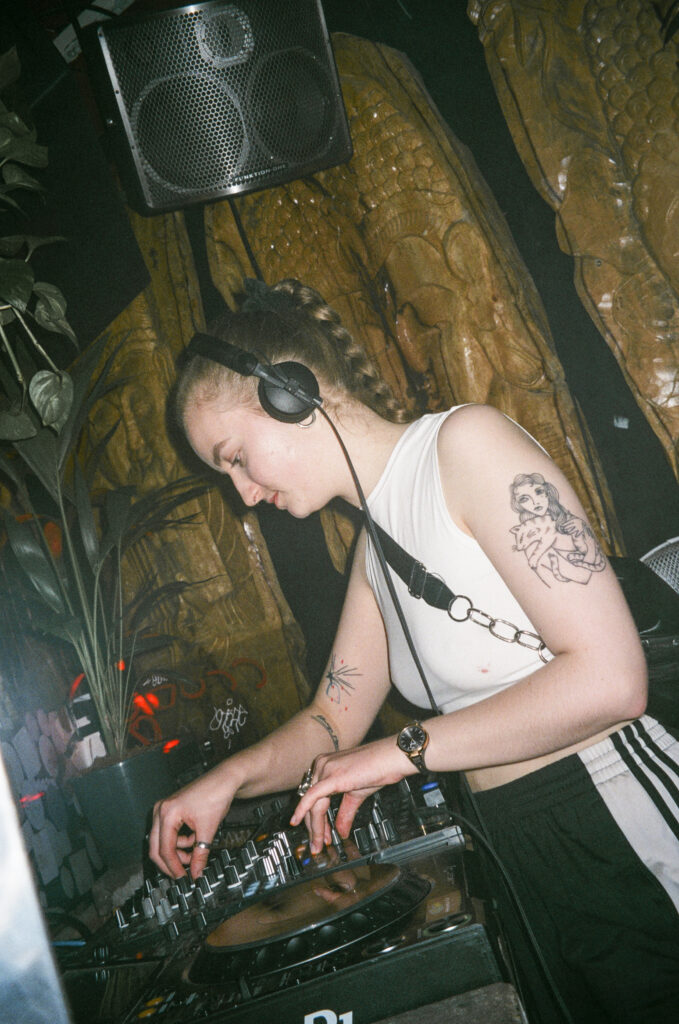
DJ and animator Emma Murphy may be better known to you as Rhyzine. The second co-founder of HONEYPOT, Emma first got into music while in school but pursued animation as it “felt like a more stable career”. Now, she splits her time between various projects as well as performing across the city for various club nights and collectives.
Murphy, like many nightlife performers, is aware of the rising costs of living and the knock-on effects it has had on Dublin’s nightlife scene: “Balancing ticket prices with making sure people are paid well is hard, especially with inflation. But because I’m a freelance creative and animator, I know what it’s like to feel underpaid so, we’ve made it our policy to do the best we can.”
Murphy’s artwork can be found plastered throughout Dublin city, most notably on the branding for HONEYPOT which she cofounded alongside Kerry Mahony. The club night is ultimately a passion project between the two, founded through a mutual interest in creating a space for “gay girls and friends”. When asked what the experience was like founding the brand and what the reaction was like, Emma notes that if there were any negative reactions she “didn’t see them or they didn’t exist.”
“HONEYPOT is a community space for different kinds of music and people to exist where they couldn’t before. It’s really nice, the way it’s worked out so far.”
Our conversation turns to the difficult relationship between creating art and not knowing if it will be appreciated, let alone funded. “There’s this conflict I have between wanting to create and buying into the capitalistic nature of it. It feels cyclical sometimes.”
“I know there are government grants available, but it’s easy to see why people look to move away in order to pursue creative careers,” Murphy explains.
You can stream some of Rhyzine’s work here.
Elsewhere on District: Celebrate Seachtain na Gaeilge with these Irish-themed businesses
